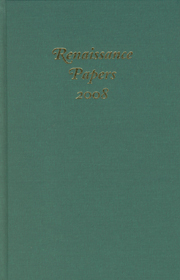Book contents
- Frontmatter
- Contents
- Renaissance Papers
- Cardinal Wolsey: The English Cardinal Italianate
- Pope Gregory and the Gens Anglorum: Thomas Stapleton's Translation of Bede
- The Spenserian Paradox of Intended Response
- Lucan, Marlowe, and the Poetics of Violence
- Hell Is Discovered
- Private and Public Plays in the Private Theaters: Speculation on the Mercenary Methods of Second Paul's and Second Blackfriars
- Staging Dismemberment in Early Modern Drama: Playing Mnemonics and Meaning
- Serving Theater in Volpone
- Troilus and Cressida: An Epitaph for the History Play
- “What thing thou art, thus double-formed”: Naming, Knowledge, and Materialism in Paradise Lost
Private and Public Plays in the Private Theaters: Speculation on the Mercenary Methods of Second Paul's and Second Blackfriars
Published online by Cambridge University Press: 12 September 2012
- Frontmatter
- Contents
- Renaissance Papers
- Cardinal Wolsey: The English Cardinal Italianate
- Pope Gregory and the Gens Anglorum: Thomas Stapleton's Translation of Bede
- The Spenserian Paradox of Intended Response
- Lucan, Marlowe, and the Poetics of Violence
- Hell Is Discovered
- Private and Public Plays in the Private Theaters: Speculation on the Mercenary Methods of Second Paul's and Second Blackfriars
- Staging Dismemberment in Early Modern Drama: Playing Mnemonics and Meaning
- Serving Theater in Volpone
- Troilus and Cressida: An Epitaph for the History Play
- “What thing thou art, thus double-formed”: Naming, Knowledge, and Materialism in Paradise Lost
Summary
IN this essay I will argue that an essential and defining method of operation employed by second Paul's and second Blackfriars was to promote themselves as “theaters for hire.” Evidence of these companies catering in various ways to playwrights and their friends and other coteries has long been noted in the historical record and in surviving play-texts, but I believe that there is less frequently noted evidence raising the possibility of more and different kinds of special arrangements with individuals, groups, or institutions. This evidence challenges the idea that these companies negotiated the London theatrical marketplace in ways closely analogous to the adult companies. I contend that the mercenary methods of second Paul's and second Blackfriars made the ventures particularly attractive to citizen-class investors not primarily by promising profit, but by promising social connections and possible brushes with the rich and famous. And in both their regular and special performances, the companies' methods enabled them to emphasize the peculiar stake that audiences had in their direction and survival.
In recent years there has been a tendency to view the operators of second Paul's and second Blackfriars as greedy entrepreneurs trying to, as Michael Shapiro characterizes the position, “get rich on the backs of a juvenile labor force.” However, arguably the best evidence of this kind of acquisitive attitude appears in the context of Paul's and Blackfriars's short-lived competition in the private children's theater industry, the Whitefriars troupe that formed around 1606–7.
- Type
- Chapter
- Information
- Renaissance Papers 2008 , pp. 89 - 112Publisher: Boydell & BrewerPrint publication year: 2009



